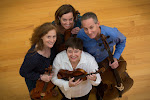As we are in the dog days of summer, with everyone in the quartet scattered about doing their various summer projects, it seemed a good time to blog about travel. Not the fun kind that takes you to your favorite vacation destination, but the very different, very specialized business travel of a string quartet. [WARNING]: As the cellist in the Serafin, I probably have the most gruesome war stories to share - some of this is not for the faint of heart.
While we do not travel as much as some quartets who tour for the majority of their work, Serafin Quartet has taken a number of trips by plane and automobile, and the travels, while usually fun and fulfilling (certainly from the performance standpoint), offer unique challenges. Traveling by car is not too big a deal, other than the extra time and energy required to be on the road. In our trips, we have tended to travel in pairs, mostly because of logistics of where we all live, with separate departures from Philadelphia and Wilmington. Driving together to concerts and tours has been a wonderful way to get to know one another and enjoy each other's company. The most compelling reason to drive to destinations far away, instead of flying (we have driven as far as Atlanta from our home base), is my darn cello. We have flown too, but it's a special, and expensive, challenge.
Given that I play a nearly 300-year-old Italian instrument worth way more than I am, we always purchase a seat, so flying to a concert means purchasing five tickets, not four - a pricy proposition, even if the concert presenter is paying us pretty well. You might be thinking, "But won't the good people at [insert your favorite carrier's name her] Airlines take good care of the cello in baggage if you tell them how valuable and fragile it is?" My answer to that, sadly, is this:
This (not the Testore, but a couple of cellos ago) is what happened the last time I checked a cello as baggage, in what I thought was a very secure travel case, back in the summer of 1996. When confronted with this evidence, the head of baggage at La Gaurdia Airport, for an airline not to be mentioned (but it rhymes with "Flaberican"), actually wondered aloud that perhaps I did this to the instrument so I could get some money back. So, no, I don't check the cello anymore.
Flying with the cello as a ticket-holding passenger is a very special way to travel, sometimes horrifying, sometimes hilarious. I've worked on some pre-emptive responses to well-meaning folks at the airport, such as "Don't worry, it fits through the X-ray machine" and "No, I don't wish that I played the flute", and I still get a quasi-sadistic sense of giddiness when I see the horrified look on a flight attendant's face, right before saying "It's okay, it has a ticket". While my SSQ colleagues get to their seats and put their violins and viola in the overhead compartment, I go through the process of getting a seatbelt extender and strapping old Testore in its seat, usually with a few more pre-emptive remarks: "Yes, full fare, I'm afraid", "Yes, I should get its snack" and, oftentimes a reprise of "No, I don't wish I played the flute."
Other than the photo-evidenced incident above, though, I have generally had pretty smooth sailing, including our flight to London a few years ago, where the very earnest people at British Airways secured the cello into the seat for me in such a way that it would have likely been the only one on board to survive a major crash. It looked something like this:
 |
| This isn't my cello, but slightly overanxious protection such as this is common on a few international carriers. |
Some other cellists, and recently some notable ones, have not fared so well in their travels. The troubles of famed cellist Lynn Harrell with Delta Airlines were just highlighted, to typically hyperbolic and hilarious effect, by Stephen Colbert of Comedy Central (watch at your own risk!):
A few years ago, Greg Beaver, of the wonderful Chiara Quartet, was told he had to upgrade his cello's tickets to first class to be able to board and fly. Seeing as that would have destroyed any earnings the quartet would have made, he had to send his wife (also his quartet mate) on the flight with their 11-month-old daughter while he waited for another flight with a less combative flight crew.
And earlier this year, touring cellist Alban Gerhardt had his bow and cello damaged (the bow most likely destroyed) when a TSA agent carelessly closed the case after inspecting it.
So, it can be a big challenge for us to travel, particularly flying with the cello, but when it comes down to it, it's a worthwhile hurdle to overcome in getting to do what we do, even without the frequent flyer miles.
Cheers,
Larry



